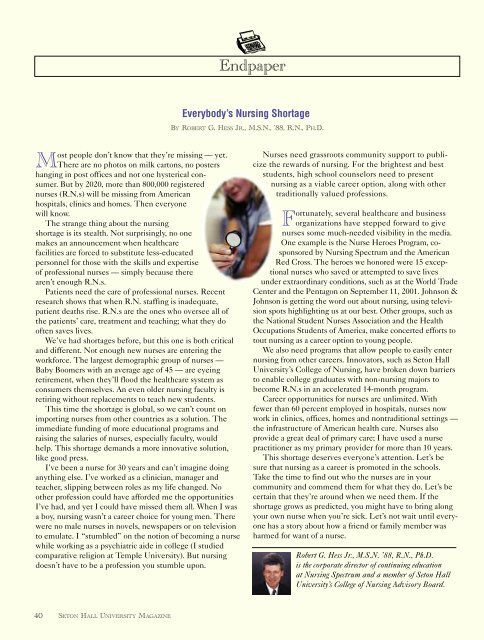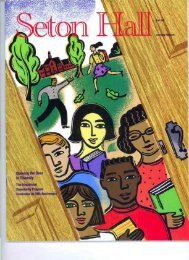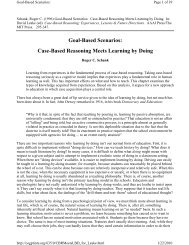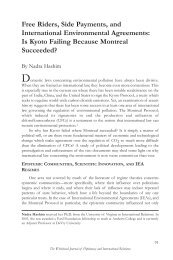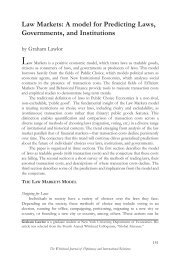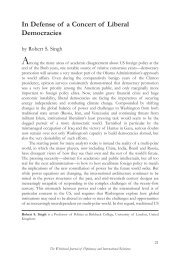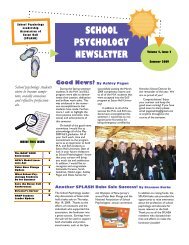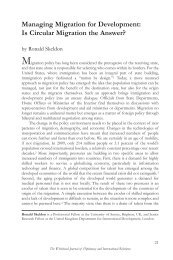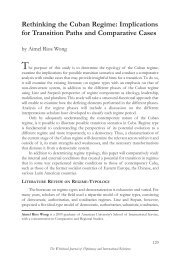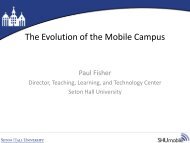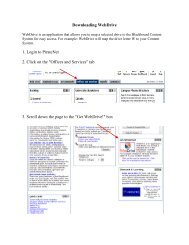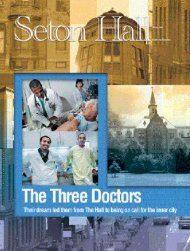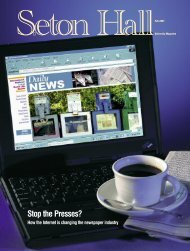Seton Hall Magazine, Winter 2003 - Seton Hall University
Seton Hall Magazine, Winter 2003 - Seton Hall University
Seton Hall Magazine, Winter 2003 - Seton Hall University
Create successful ePaper yourself
Turn your PDF publications into a flip-book with our unique Google optimized e-Paper software.
Most people don’t know that they’re missing — yet.<br />
There are no photos on milk cartons, no posters<br />
hanging in post offices and not one hysterical consumer.<br />
But by 2020, more than 800,000 registered<br />
nurses (R.N.s) will be missing from American<br />
hospitals, clinics and homes. Then everyone<br />
will know.<br />
The strange thing about the nursing<br />
shortage is its stealth. Not surprisingly, no one<br />
makes an announcement when healthcare<br />
facilities are forced to substitute less-educated<br />
personnel for those with the skills and expertise<br />
of professional nurses — simply because there<br />
aren’t enough R.N.s.<br />
Patients need the care of professional nurses. Recent<br />
research shows that when R.N. staffing is inadequate,<br />
patient deaths rise. R.N.s are the ones who oversee all of<br />
the patients’ care, treatment and teaching; what they do<br />
often saves lives.<br />
We’ve had shortages before, but this one is both critical<br />
and different. Not enough new nurses are entering the<br />
workforce. The largest demographic group of nurses —<br />
Baby Boomers with an average age of 45 — are eyeing<br />
retirement, when they’ll flood the healthcare system as<br />
consumers themselves. An even older nursing faculty is<br />
retiring without replacements to teach new students.<br />
This time the shortage is global, so we can’t count on<br />
importing nurses from other countries as a solution. The<br />
immediate funding of more educational programs and<br />
raising the salaries of nurses, especially faculty, would<br />
help. This shortage demands a more innovative solution,<br />
like good press.<br />
I’ve been a nurse for 30 years and can’t imagine doing<br />
anything else. I’ve worked as a clinician, manager and<br />
teacher, slipping between roles as my life changed. No<br />
other profession could have afforded me the opportunities<br />
I’ve had, and yet I could have missed them all. When I was<br />
a boy, nursing wasn’t a career choice for young men. There<br />
were no male nurses in novels, newspapers or on television<br />
to emulate. I “stumbled” on the notion of becoming a nurse<br />
while working as a psychiatric aide in college (I studied<br />
comparative religion at Temple <strong>University</strong>). But nursing<br />
doesn’t have to be a profession you stumble upon.<br />
40 SETON HALL UNIVERSITY MAGAZINE<br />
r<br />
Endpaper<br />
Everybody’s Nursing Shortage<br />
BY ROBERT G. HESS JR., M.S.N., ’88, R.N., PH.D.<br />
Nurses need grassroots community support to publicize<br />
the rewards of nursing. For the brightest and best<br />
students, high school counselors need to present<br />
nursing as a viable career option, along with other<br />
traditionally valued professions.<br />
Fortunately, several healthcare and business<br />
organizations have stepped forward to give<br />
nurses some much-needed visibility in the media.<br />
One example is the Nurse Heroes Program, cosponsored<br />
by Nursing Spectrum and the American<br />
Red Cross. The heroes we honored were 15 exceptional<br />
nurses who saved or attempted to save lives<br />
under extraordinary conditions, such as at the World Trade<br />
Center and the Pentagon on September 11, 2001. Johnson &<br />
Johnson is getting the word out about nursing, using television<br />
spots highlighting us at our best. Other groups, such as<br />
the National Student Nurses Association and the Health<br />
Occupations Students of America, make concerted efforts to<br />
tout nursing as a career option to young people.<br />
We also need programs that allow people to easily enter<br />
nursing from other careers. Innovators, such as <strong>Seton</strong> <strong>Hall</strong><br />
<strong>University</strong>’s College of Nursing, have broken down barriers<br />
to enable college graduates with non-nursing majors to<br />
become R.N.s in an accelerated 14-month program.<br />
Career opportunities for nurses are unlimited. With<br />
fewer than 60 percent employed in hospitals, nurses now<br />
work in clinics, offices, homes and nontraditional settings —<br />
the infrastructure of American health care. Nurses also<br />
provide a great deal of primary care; I have used a nurse<br />
practitioner as my primary provider for more than 10 years.<br />
This shortage deserves everyone’s attention. Let’s be<br />
sure that nursing as a career is promoted in the schools.<br />
Take the time to find out who the nurses are in your<br />
community and commend them for what they do. Let’s be<br />
certain that they’re around when we need them. If the<br />
shortage grows as predicted, you might have to bring along<br />
your own nurse when you’re sick. Let’s not wait until everyone<br />
has a story about how a friend or family member was<br />
harmed for want of a nurse.<br />
Robert G. Hess Jr., M.S.N. ’88, R.N., Ph.D.<br />
is the corporate director of continuing education<br />
at Nursing Spectrum and a member of <strong>Seton</strong> <strong>Hall</strong><br />
<strong>University</strong>’s College of Nursing Advisory Board.


